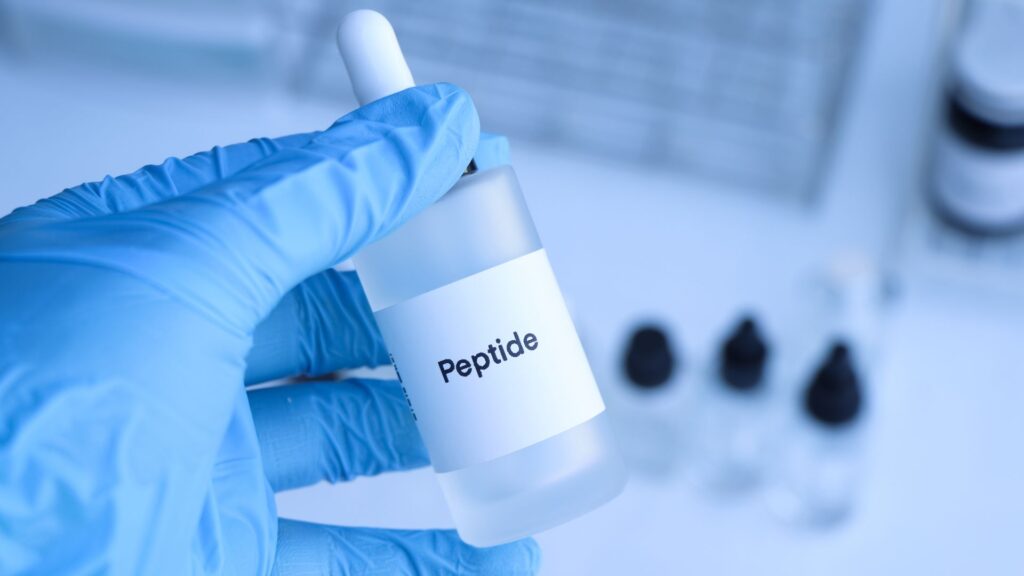|
Getting your Trinity Audio player ready...
|
Peptides, the smaller cousins of proteins, are gaining attention for their potential to enhance health and wellness. Composed of amino acids, these bioactive compounds are becoming a key focus for individuals looking to improve their well-being, from skin health to chronic disease management. With a rising interest in how these molecules can benefit various aspects of health, this guide offers a practical approach to incorporating peptides into your health regime.
Key Principles of Peptide Use
What Are Peptides and How Do They Work?
Peptides are short chains of amino acids, the building blocks of proteins, which are essential to numerous bodily functions. Unlike proteins, peptides are smaller and can be more easily absorbed by the body, making them an intriguing focus for those looking to optimize their health. They act as messengers, signaling cells to perform specific functions such as building collagen and elastin for skin health, regulating immune function, or even enhancing cognitive performance and sleep quality.
Peptides can be naturally occurring or synthetically made, and they are used in a variety of health and wellness products. They can mimic or influence how our bodies work, potentially leading to improvements in areas like skin appearance, weight loss, and muscle repair. Their versatility and efficiency make peptides a valuable addition to a wellness plan, provided they are used correctly and safely.
Essential Pre-Integration Considerations
Before integrating peptides into your health regime, it’s crucial to understand your specific needs and goals. Identifying whether you’re looking to improve skin health, enhance physical performance, or manage a chronic condition can help determine the most suitable peptide therapy. It’s also important to consider any existing health conditions and to consult with a healthcare professional to ensure that peptide use is appropriate and safe for you.
Another key consideration is lifestyle factors such as diet, exercise, and stress levels, which can all influence the effectiveness of peptide supplementation. Understanding how peptides interact with these factors can help you make more informed decisions about their use in your wellness plan.
It’s essential to have realistic expectations about the outcomes of peptide use. While peptides can support health and wellness goals, they are not a magic solution and should be used as part of a comprehensive approach to well-being that includes a balanced diet, regular exercise, and proper hydration.
Sourcing and Quality Assurance
When considering peptides for health and wellness, the source and quality of the products are paramount. High-quality peptides should be pure, correctly formulated, and free from contaminants. To ensure you are receiving a product that meets these standards, look for suppliers who provide transparent information about their sourcing and manufacturing processes.
Quality assurance also extends to the type of product you choose. Peptides are available as oral supplements, injectables, and topical formulations. Each type has different absorption rates and bioavailability, which can affect their efficacy. For instance, oral supplements may be less effective than injectables due to breakdown in the digestive system, while topical formulations are designed to target skin concerns directly.
Methods of Peptide Integration
Using Oral Peptide Supplements
Oral peptide supplements are a convenient and non-invasive way to incorporate peptides into your health regime. They come in various forms, including capsules, powders, and liquids. When taking oral supplements, it’s important to follow the recommended dosage and to be aware that factors like digestive enzymes can affect their absorption and potency.
To enhance the benefits of oral peptide supplements, they can be taken in conjunction with a well-rounded diet that supports overall health. In specific, a diet rich in proteins, healthy fats, and antioxidants can complement the effects of peptides on skin health and immune function.
It’s worth noting that oral supplements can be a part of a wellness plan for those seeking to improve their skin’s hydration, elasticity, and appearance, as well as for biohackers looking to optimize their bodily functions through dietary interventions.
Injectable Peptides: Use and Precautions
Injectable peptides, often used by healthcare professionals and individuals seeking more targeted therapy, bypass the digestive system and enter the bloodstream directly. This method can be particularly effective for peptides involved in weight loss, muscle growth, and chronic disease management.
However, the use of injectable peptides requires careful consideration and often medical supervision. It’s crucial to understand the proper injection techniques, dosages, and potential side effects. Consulting with a healthcare professional is essential to ensure that injectable peptide therapy is appropriate for your health condition and goals.
Topical Application for Dermatological Use
Topical peptide formulations, such as peptide moisturizers, peptide eye serums, and peptide skincare products, are designed to target the skin directly. These products can improve the skin’s appearance by enhancing hydration, reducing wrinkles, and promoting collagen and elastin production, leading to increased elasticity and a more youthful complexion.
Regular use of peptide skincare products, as part of a comprehensive skincare routine, can contribute to the skin’s health and resilience against environmental stressors, such as UV-induced aging.
When selecting topical peptide products, consider the specific skin concerns you wish to address. It’s also vital to choose products suitable for your skin type and to patch-test any new product to avoid adverse reactions.

Practical Uses of Peptide Integration in Health
Peptide Use in Enhancing Physical Performance and Recovery
Peptides have gained popularity among athletes and fitness enthusiasts for their potential to improve physical performance and speed up recovery. Certain peptides such as ghrelin are known to stimulate the production of growth hormone, which can aid in muscle repair and fat loss, contributing to an overall enhanced athletic performance.
Incorporating peptides into a fitness regimen can also support better recovery post-exercise. Peptides like collagen, when taken as a supplement, can help in repairing connective tissues and reducing the risk of injuries. They can also improve joint health and reduce inflammation, leading to quicker recovery times and improved training outcomes.
Peptide Integration for Managing Chronic Conditions
Peptides have shown promise in managing chronic conditions due to their ability to mimic natural bodily processes. Peptide therapy can be particularly useful for conditions such as diabetes, where peptides like semaglutide and tirzepatide play a role in regulating blood sugar levels and promoting satiety.
For individuals managing chronic conditions, peptides can be a valuable addition to their treatment plan, potentially reducing the need for more invasive therapies and improving overall quality of life. However, it is critical that any peptide therapy is closely monitored by healthcare professionals to ensure optimal dosing and to manage any potential side effects.
Peptide Therapy for Advancing Dermatological Health and Treatment
Peptide therapy has become a game-changer in dermatology, offering new ways to address skin health and combat the signs of aging. These powerful amino acid sequences can stimulate the skin’s natural repair processes, leading to improved texture, tone, and resilience.
A latest investigation has shown that products like the OS-01 peptide can act as a barrier to protect the skin and promote cellular regeneration:
“The OS-01 formulation significantly improved one aspect of skin barrier function, as evidenced by reduced trans-epidermal water loss compared to both baseline and vehicle control.”
Peptide-based treatments are also being explored for more serious dermatological conditions, offering hope for advancements in skin health and therapy.
Conclusion
In conclusion, it can be said that peptides present a promising avenue for those seeking to enhance their physical performance, manage chronic conditions, and improve skin health. Individuals can potentially reap significant health benefits, by understanding the key principles of peptide use, considering quality sources, and integrating peptides through various methods.
As with any health intervention, it’s important to approach peptide integration with care, informed by expert knowledge and in consultation with healthcare professionals. Remember, peptides are not a standalone solution but rather a component of a holistic health strategy that includes proper nutrition, exercise, and self-care.
Disclaimer: Please note that many peptide therapies are not FDA-approved and their efficacy and safety have not been fully established. It is crucial to consult with your healthcare provider before starting any new supplements or treatments, including peptide therapy.
References
Firth, Ashley, Amalia Aggeli, Julie L. Burke, Xuebin Yang, and Jennifer Kirkham. “Biomimetic self-assembling peptides as injectable scaffolds for hard tissue engineering.” (2006): 189-199.
Kojima, Masayasu, Hiroshi Hosoda, and Kenji Kangawa. “Ghrelin, a novel growth-hormone-releasing and appetite-stimulating peptide from stomach.” Best Practice & Research Clinical Endocrinology & Metabolism 18, no. 4 (2004): 517-530.
Mathew-Steiner, Shomita S., Sashwati Roy, and Chandan K. Sen. “Collagen in wound healing.” Bioengineering 8, no. 5 (2021): 63.
Mathur, Deepika, Ayesha Mehta, Priyanka Firmal, Gursimran Bedi, Charu Sood, Ankur Gautam, and Gajendra PS Raghava. “TopicalPdb: A database of topically delivered peptides.” Plos one 13, no. 2 (2018): e0190134.
Richard, Joël. “Challenges in oral peptide delivery: lessons learnt from the clinic and future prospects.” Therapeutic Delivery 8, no. 8 (2017): 663-684.
Zonari, Alessandra, Lear E. Brace, Nathaniel HO Harder, Claire Harker, Carolina R. Oliveira, Mariana Boroni, and Juliana L. Carvalho. “Double‐blind, vehicle‐controlled clinical investigation of peptide OS‐01 for skin rejuvenation.” Journal of Cosmetic Dermatology (2024).



This blog post does an excellent job of highlighting the promising benefits of peptides for enhancing health and wellness! 🌟 It’s fascinating to learn how these small but mighty compounds can improve everything from skin health to physical performance and chronic condition management. 🏋️♂️💪 Incorporating peptides into a wellness routine, with proper guidance and realistic expectations, seems like a smart move towards a healthier lifestyle. Have any of you already tried using peptides? If so, what benefits have you noticed? 🤔